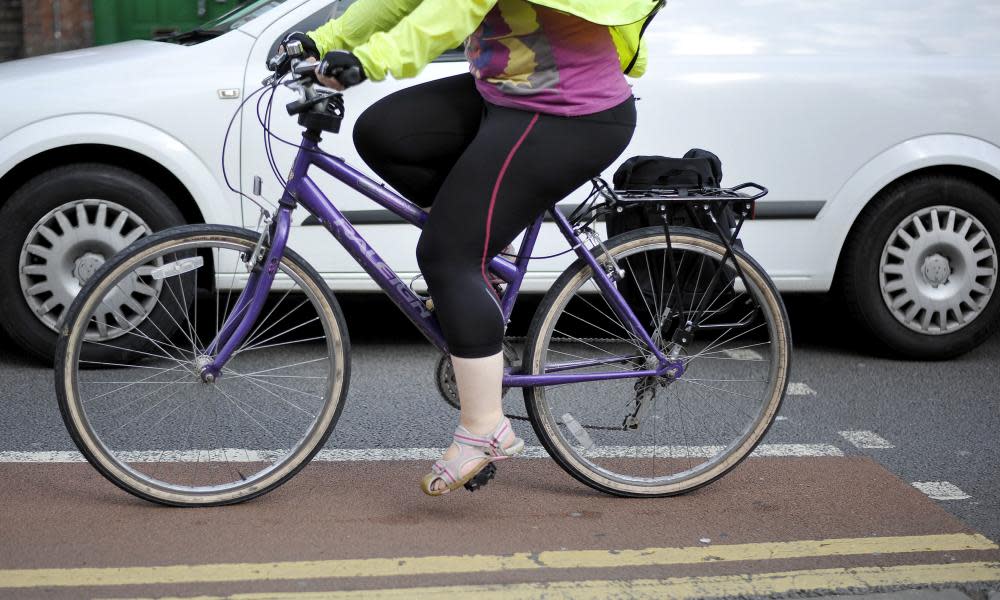Sunak ‘backs drivers’ with curbs on 20mph limits and bus lanes

Rishi Sunak has pledged to end “anti-car measures” as he set out a series of ideas to prioritise the needs of drivers at the likely expense of other road users such as bus passengers, cyclists and pedestrians.
Outlining what he called a “long-term plan to back drivers”, the prime minister unveiled a clampdown on 20mph limits, bus lanes, low-traffic neighbourhoods (LTNs), and the ability of councils to fine drivers who commit offences.
The plan also pledges to stop councils implementing so-called 15-minute cities to “prevent schemes which aggressively restrict where people can drive”, language which leans into claims by some objectors that the idea is a UN-led conspiracy to limit people’s ability to travel.
While much of the plan, first revealed by the Guardian on Thursday, is framed as a consultation, it marks a notable shift in transport policy, going against efforts by recent UK governments to try to ease congestion by making modes of travel other than the car more appealing.
It follows the unexpected Conservative win in July’s Uxbridge and South Ruislip byelection ahead of the expansion of London’s ultra-low emission zone, and after Sunak’s decision to ease rules on the transition towards electric vehicles.
The new plans for roads in England, formally led by the Department for Transport (DfT), but understood to be steered directly by No 10, aim to make it harder for councils to introduce a range of measures designed to make streets safer and more convenient for bus passengers, cyclists and pedestrians.
On 20mph speed limits, which have been shown to reduce the likelihood of deaths or serious injuries, especially with more vulnerable road users, guidance on where they can be introduced will be reviewed “to prevent their blanket use in areas where it’s not appropriate”, the DfT statement said, giving no more details.
There will also be amended guidance for LTNs, which seek to increase active travel by restricting through traffic on smaller residential streets, to “focus on local consent”, the DfT said, again giving no details.
An existing review into LTNs will “consider measures for existing anti-driver policies that did not secure local consent”, it added, citing 15-minute cities, which are an urban planning concept based around having shops and workplaces near homes.
In a measure already condemned by the organisation representing the UK’s bus companies, guidance will be revised so bus lanes only exclude other vehicles “when necessary”, potentially meaning only in peak times, which could slow journeys for bus users at other periods.
There will also be a consultation on allowing motorcycles to use bus lanes, an idea consistently opposed by cycling groups for safety reasons.
There will be a call for evidence on ways to limit the ability of councils to fine drivers for traffic offences, and to prevent “over-zealous traffic enforcement, such as yellow-box junctions”.
This idea could be particularly controversial given that many councils use fines issued via automatic number plate recognition cameras to enforce road safety schemes such as LTNs and school streets, which close areas outside schools to motor traffic at particular times of the day.
Also in the plan is a proposal to unify the apps people use to pay for parking, and to help councils impose fees on utility companies which dig up roads, with at least half the money having to be spent on fixing potholes.
Sunak said there had been “a clampdown on drivers [which] is an attack on the day-to-day lives of most people across the UK who rely on cars to get to work or see their families”, without elaborating.
He said: “This week the UK government will set out a long-term plan to back drivers, slamming the brakes on anti-car measures across England. We are taking the necessary decision to back the motorists who keep our country moving.”
If the measures are implemented, it will place UK towns and cities on an opposite trajectory to those in most other developed nations, which are in general seeking to promote public transport and active travel, especially for shorter journeys.
Currently in England, almost one in five trips under a mile are done by motor vehicle, and two-thirds of those between one and five miles.
In a joint statement earlier on Friday, the heads of Ramblers, Sustrans, British Cycling, Cycling UK, Living Streets and Bikeability Trust said Sunak’s plan would end up leaving people feeling they had no choice but to drive, even if they would rather use other means.
The joint statement said: “When the government should be giving people more opportunities to live their lives responsibly, it’s robbing them of options. When ministers could be promoting public transport, cycling and walking as cheap sustainable options in a cost of living and climate crisis, they’re entrenching congestion and reliance on driving for short, local journeys.”

 Yahoo News
Yahoo News 
